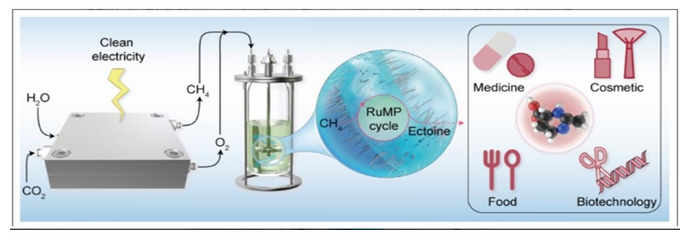To address energy demands and enhance microbial conversion efficiency, a Chinese research team has embarked on a groundbreaking innovation to produce ectoine (Ectoin, CAS No.: 96702-03-3). They first synthesized a CuPc/BNCNT catalyst with high selectivity and productivity, designed to accelerate the conversion of carbon dioxide (CO2) into methane (CH4) on an economically viable scale, achieving a Faraday efficiency of 73.5%. This catalyst serves as a pivotal component in their system.
Subsequently, utilizing the high-energy one-carbon substrate CH4 as a carbon source, the research team effectively promoted the growth of engineered methane-oxidizing bacteria. Through bioconversion, these bacteria synthesized high-value long-carbon-chain molecules known as ectoine.
After establishing an efficient electrocatalytic system, the research team further leveraged metabolic engineering modifications and developed two-stage fermentation strategies to achieve a seamless integration between electrocatalysis and a scalable CH4 bioconversion system. This integrated approach not only maximizes the utilization of CO2 but also significantly boosts the production of ectoine, offering a promising solution for both energy sustainability and high-value chemical production. The research underscores the potential of combining electrocatalysis with advanced biotechnological strategies to address global challenges related to carbon utilization and energy generation.
